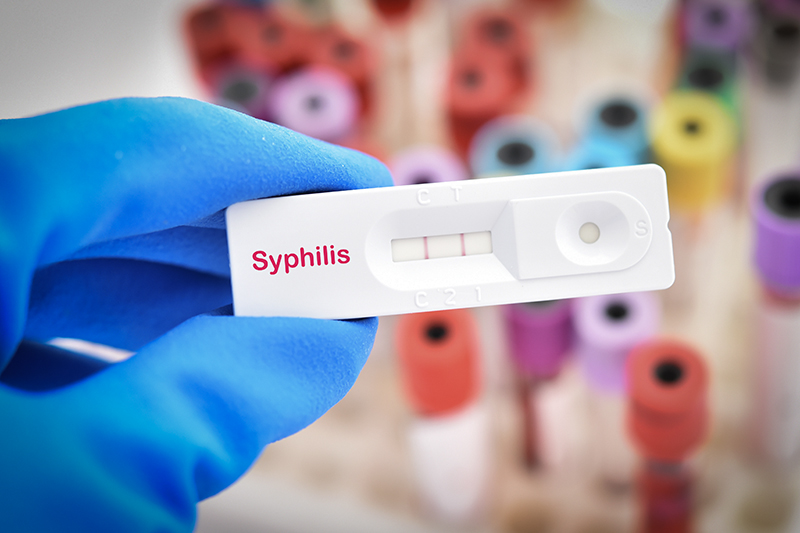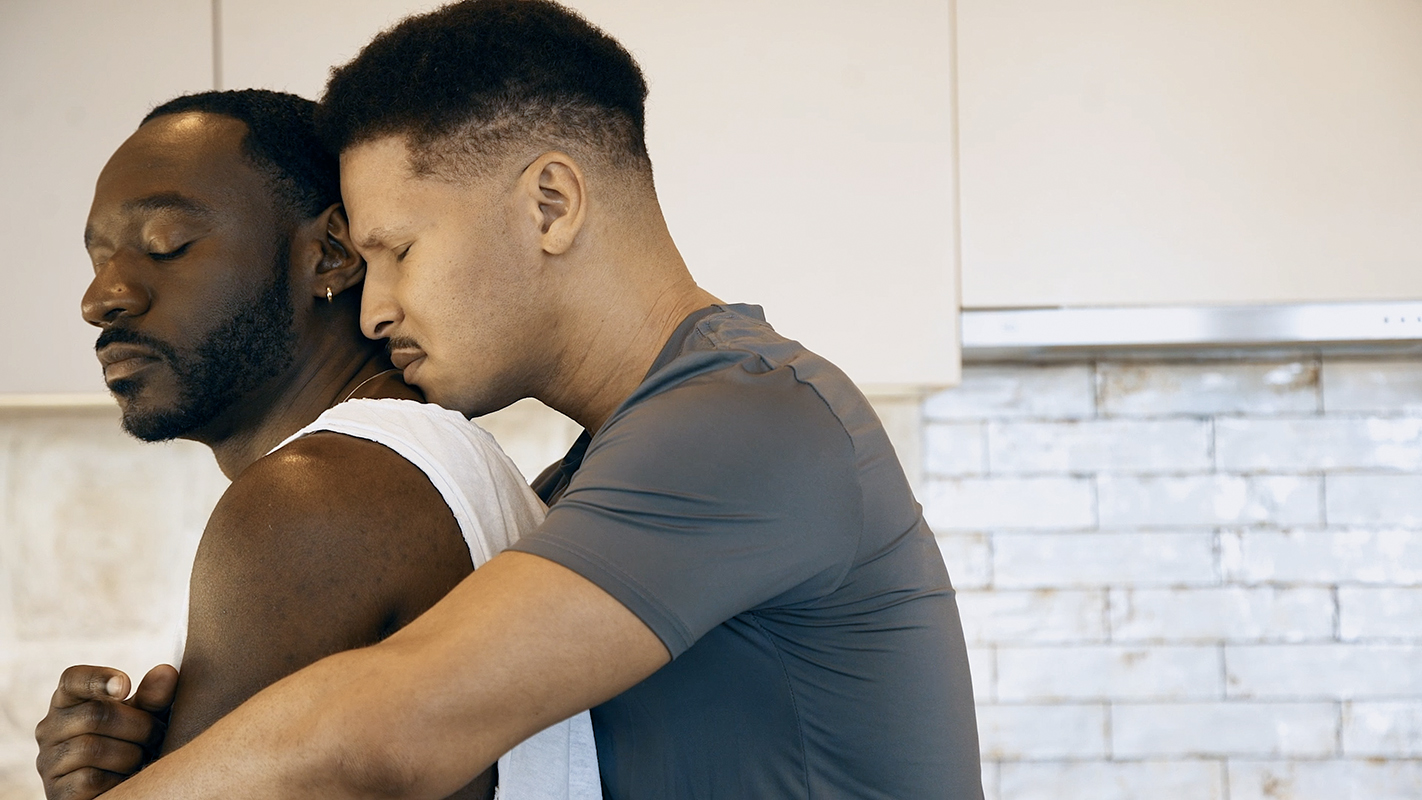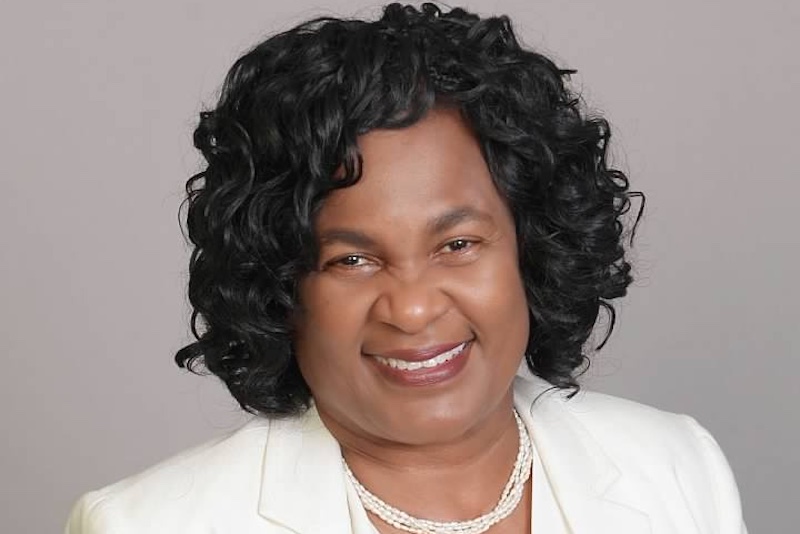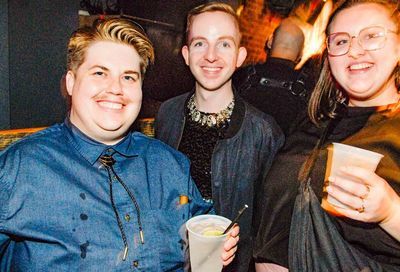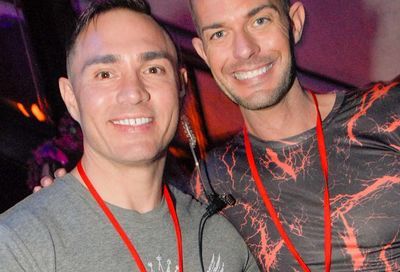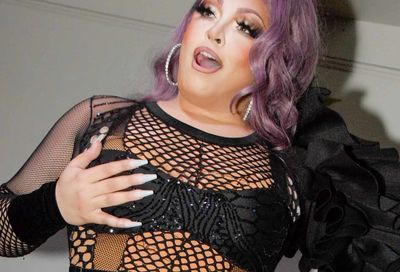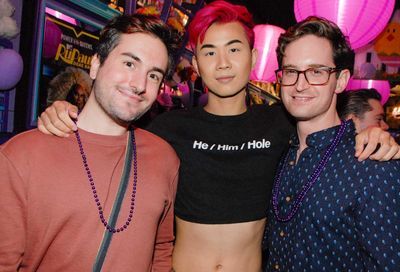It Starts with Human
Four Washingtonians share their stories of living with HIV
For every 100,000 D.C. residents in 2004, 179 were diagnosed with AIDS, the highest rate in the nation.
Out of the total D.C. population of 550,000 to 600,000 people, federal and local estimates place the number of HIV-infected residents between 17,800 and 25,400.
But data is one thing. People are another.
Every pinpoint on a statistician’s graph has a name, a face, a story to tell. These points are not abstract figures to plug into calculations, but our friends, our neighbors, the passerby on the sidewalk, and most certainly ourselves — gay, straight and bi. Black, white, Asian and Latino. Male, female and trans. Young and old.
Since 1988, World AIDS Day has marked the global impact of the human immunodeficiency virus — the virus that causes AIDS, or Acquired Immune Deficiency Syndrome. This annual reckoning is often marked with optimism, mourning, resolve, fear or any other number of possible responses to one of the deadliest pandemics the planet has ever experienced.
According to current data from the World Health Organization, 39.5 million people are living with HIV, with an estimated 4.3 million of these infections occurring in 2006. To date, more than 25 million people have died of AIDS-related illnesses.
But those are numbers, not stories.
And despite the stigma that still remains a quarter century after HIV was identified — a lessened stigma, but a tenacious stigma still — some Washingtonians are willing to share their stories of life with HIV. Here are four.
Wallace Corbett
Faith, Hope and Charity
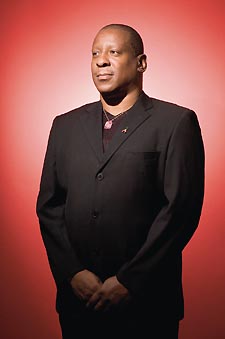 Corbett |
THE UNSEASONABLY warm November afternoon suits Wallace Corbett’s sunny disposition. The default look on his face is a smile — not a toothy grin, but something more reminiscent of the Mona Lisa. And Wallace Corbett has reason to be happy.
”My numbers have remained the same for a very long time,” says the 45-year-old D.C. native. Though Corbett’s carried HIV for roughly two decades, the virus in his system has been as tame as it’s been unwelcome.
”I tried a [medication] regimen, and it did not work for me at all. I couldn’t work. It had me almost zombie-like, exhausted.” So Corbett and his doctor came to an agreement: If regular monitoring showed his T-cell counts and viral loads hovering at acceptable levels without medication, he would simply not take any. Since that initial foray into pharmaceuticals, he’s remained meds-free and healthy.
Corbett cannot point to any particular reason why his body has kept the virus in check, offering that he puts his faith in, well, faith.
”I’m practicing my belief in Christ. I enjoy volunteering…. My religious belief is that you should help anybody at anytime without asking for gratification. I volunteer the same way I go to my job. The way you treat people every day is God speaking. Treat people kindly. I practice what God tells us to do: Treat others with kindness and help without asking.”
One way Corbett has put his belief into practice is AIDS Rides. He’s participated in seven D.C.-based rides.
”The rides taught me kindness, and to push yourself further than you can imagine pushing yourself. When you’re on a bicycle, by yourself in an area where you’ve never been, told to just go in this direction and you can’t see the one ahead of you or behind you, the question is: Am I going the right way? Can I make it? What if I fall? Can I push myself?
”Then you complete the event and you say to yourself, ‘You know what? There’s more to me than what I fear.”’
And there’s more to Corbett than his pleasant disposition. Living in Chinatown with his two cocker spaniels, he is a widower who mourns the loss of his partner and best friend, Myron. He mourns for a generation, as well.
”The epidemic has taken some really great minds away — wonderful designers, and artists, and singers, and people in sports and business. I sometimes wonder what the world would have been if they were still here. Some of the barriers for gay society would not be so difficult. We would not be so slow in reaching things like same-sex marriage, because a lot of those who have gone were truly amazing advocates. They were intelligent, articulate, compassionate advocates who had the skills to motivate others to move forward. Groups like ACT-UP knew how to get the issues on the front page.”
Corbett’s sadness over what has been lost is matched in equal parts by his frustration over a lack of kindness, a lack of leadership and ongoing stigma when it comes to HIV. For example, while his church, the Metropolitan Community Church of Washington, D.C., meets his expectations, other churches have fallen short.
”Where is the volunteerism? Churches are there to help the sick, the homeless, the less fortunate. There are churches on every block — they’re like liquor stores. So why are there homeless on these streets?”
Before joining MCC, Corbett attended an African-American church.
”They had cultural issues that are falsely based on their history. You can’t say you don’t respect homosexuality when your choir, your deacon, about two-thirds of your members are [homosexual]. Those are the things that continue a stigma that continues to affect and erode black culture.”
Moving from the spiritual to the political, Corbett says he wishes the city’s leadership — particularly during this post-election, transitional period — would lead on HIV by example, lining up to get tested publicly, and encouraging their constituents to do the same.
From his post at the front desk of the George Washington University Hospital’s radiology department, however, Corbett says he is constantly reminded to keep things in proportion — despite the scope of the HIV pandemic, regardless of his good health, no matter the misplaced stigma.
”Life is such a short thing. You have to decide whether to value it or not. Each day, I value it.”
Enjoying each day as if it were the last helps Corbett ”walk in faith and not fear.”
”We will live, and this epidemic will pass, whether I’m on earth or not. We’re all on a journey. The question is, in the time that you have, have you made the best choices? Have you done something?”
Mark Fischer
Dancing, Not Deferring
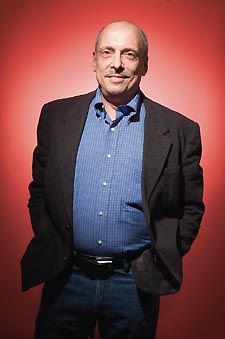 Fischer |
IT WAS 1980 in New York City and Mark Fischer was walking into the legendary nightclub, The Saint, on opening night. Having moved to D.C. from North Carolina two years earlier, when STDs were the scariest health concern in the gay community, life was good for this young man.
”I went to visit some friends and they took me as a surprise. I thought I’d died and went to heaven. It was overwhelming, all encompassing. It was a place you went with friends, and just sort of lost yourself in the music and danced.”
Trips to The Saint were the ”carrot at the end of the stick” that got Fischer through whatever toil he faced during the workweek.
”It was like going to church. In some ways, it was this spiritual communion.”
The Saint remained a constant bright spot in Fischer’s life, from the day it opened until its closing in 1988. In those years, Fischer transformed from a young gay man celebrating an unprecedented era of liberation, to someone living with HIV in the opening years of a global pandemic. In a sense, the party was over. But Fischer managed to hold onto a pragmatic sense of calm.
”I was diagnosed in ’86. I assume that I was infected probably before that. I limited my activities severely, because I wasn’t sure. It was a very stifling kind of thing.”
Fischer says there initially wasn’t much reason to get tested for HIV, as there wasn’t any treatment on offer. But by the time he and his partner, whom he’d met in 1984, were tested, it was just a matter of confirming what they’d already assumed. The security of his relationship and the dawning of HIV medications, he says, made the test results quite a bit easier to swallow.
Fischer can’t say the same for some of those medicines he’s ingested over the years, a root-beer-flavored syrup in particular.
”The worst part was that it would repeat. It would keep coming back. And it tasted like, I don’t know, rancid fish. Then I got capsules, but they still had a tendency to do a little bit of that.”
That may have contributed to Fischer’s admitted problem with taking his medications regularly — until recently he had been ”sloppy compliant” with his regimens, taking frequent ”drug holidays.”
The primary reasons, he explains, were complicated schedules for dosing his myriad medications, and side effects, such as ongoing nausea, bloating and severe gastrointestinal discomfort. But when an HIV-positive friend went blind and deaf, he found the motivation to stick to the medications that would keep cytomegalovirus, which can attack a compromised immune system, at bay.
Still, Fischer’s difficulties with his medications — and other contributing factors — led to his being hospitalized with pneumocystis pneumonia in November 2002. It was one of many hardships Fischer has faced in recent years, including losing a job and the death of his partner.
Today Fischer, 57, is regaining solid footing.
”I’m getting over the feeling that I’d really fucked my life up for good because so many negative things hit. I kept thinking, ‘If only….’ But I had this realization that doing the best I could, this is where I wound up. The void in my life — the job, the partner — is an opportunity to rebuild parts of my life that very few people get to rebuild. I can be selective of what I put in there. Now I’m looking at life differently. It’s the same thing with the HIV. It all goes together. Now I see challenges as opportunities.”
Fischer is also on a new drug regimen that has him taking four medications, but all at the same time every morning, with few side effects. He’s supplementing the pharmaceuticals by seeing a nutritionist, an acupuncturist and a massage therapist.
”The feedback I’ve gotten has reinforced to me that I’m healthy, all things considered.”
Professionally, he’s managing an organization he founded, Values in Action (VIA), with the aim of strengthening ties between the business and non-profit communities. He also expects to be partnered again, at some point.
He says HIV and other hardships have taught him not to defer life.
”I find myself sharing experiences with my parents, having far more in common with them than I would ever expect to. It’s the experience of having your friends, peers, die away in large numbers. It’s looking for things in your environment, your community, that you once had that you can’t find.
”Dealing with the disease has caused me to approach life differently. For the most part, I’d say I’ve been able to find a positive outcome. I’ve been reminded of what is important, how I should spend my time, not to think so much about the future…. You need to withdraw some of your savings, literally and figuratively. You need to withdraw and spend now, because there’s no guarantee.”
Danielle Pleasant
Strength and a Soft Spot
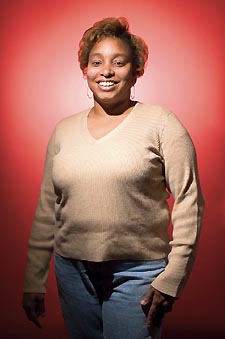 Pleasant |
AT FIRST GLANCE, Danielle Pleasant seems like a million other mothers. A 40-year-old D.C. native who lives in Southwest with four of her five children — the eldest, 19, has already moved out — she seems like a proud mom with common concerns. Pleasant jokes that one of the most important things she’s had to learn about parenting is how to be strict. It’s an expected challenge from a woman who does a good job living up to her last name.
Look a little closer, however, and it’s obvious Pleasant and her family carry some uncommon burdens. And supportive as she’s been of her kids, they’ve been as supportive of her through some difficult times.
”They’ve been with me through my addiction. They’ve been taken away from me, and we’ve been reunited. We’re pretty close,” she says. ”They know all about me being HIV-positive. They get concerned if I’m not feeling well, if I’m sick. But children are just really resilient. They’ve kept me going…. My kids are my rock. They’re the reason why I do what I do.”
Addicted to crack and six months pregnant with her fourth child, Pleasant learned of her HIV status while seeking prenatal care at Walter Reed Hospital in 1993. Her addiction was controlling her life. Though still married to her estranged husband, the father of her eldest child, Pleasant says she doesn’t know who is the father of the child she carried in 1993.
And things were just getting worse.
”When I first found out, [HIV] was just another thing on the pile. I wasn’t focused on that, because I was pregnant. I just automatically knew, ‘My baby’s going to be positive.’ And he was.”
The difficulty of progressing to AIDS wasn’t the only thing facing her newborn son — encephalopathy, hypothyroidism and high blood pressure were also present. He later lost his ability to walk.
Her baby’s medical problems compounded Pleasant’s own. Feelings of guilt about her drug addiction and her child’s resulting HIV-positive status evolved into a panic that she might be losing her mind: ”If I’d push the stroller and he wasn’t in it, I would say to myself, ‘I’ve lost my mind and my son has died, and I’m pushing the stroller as if he’s still in it.”’
That pregnancy was followed two years later by another, forcing Pleasant to make hard choices about her addiction, her life and the life of the fetus she was carrying.
”I had to figure out whether I was going to have her or not. I was afraid of having her for fear that she’d be positive. I decided to leave it in God’s hands, and I went into treatment. It wasn’t to get clean, but to show Child Protective Services that I was doing something.”
Whatever her intentions, that last pregnancy became a crossroads for Pleasant. She got treatment for her addiction. She found a supportive, albeit temporary, home at the House of Ruth shelter. And she was offered a spot in a clinical AZT trial to prevent in utero transmission of the virus. Her youngest child was born, and remains, HIV-negative.
Today, as a mother, as a bisexual woman, as a recovering addict, and as an HIV-positive person, Pleasant is a surprising picture of strength, an affirmation for the force of will. But whether it’s her work as an advocate for women and children, or as the dutiful mother of five who collects so many prescriptions for her family that the local pharmacist asked her if she was running a group home, beneath the strength there is vulnerability.
”As open as I am about it, I still go through the fear of being rejected,” says Pleasant, offering that, romantically, reactions from men and women are dependent upon the individual, not the gender.
”If someone tries to approach me or date me, I go through a couple different stages: Do I tell them now? Do I wait?”
Pleasant says she initially didn’t tell everyone due to fear of rejection. Then, when she began disclosing, she found herself not understanding why ”they liked me anyway.” Then came the fear of dating someone positive who could ”die on me,” and the fear of dating someone negative and wondering if they would ”contract the virus from me.”
”It’s a really fine line for me.”
And considering that one of Pleasant’s closest friends is a lesbian who believes she contracted HIV from another woman, Pleasant emphasizes that this stigma she’s wrestled with is pointless, in that everyone is at risk for contracting HIV.
”If I hadn’t worked on building my self-esteem, I wouldn’t feel comfortable telling you I’m HIV-positive, because I don’t know how you’re going to look at me.”
Because transmission is often via social taboos – sex, drugs — Pleasant says people have trouble talking openly about their own risks.
”It’s usually something people don’t want to deal with: drug abuse or sexual behavior. But everybody is at risk, and not everybody wants to believe that.”
Chris Rothermel
After the Storm
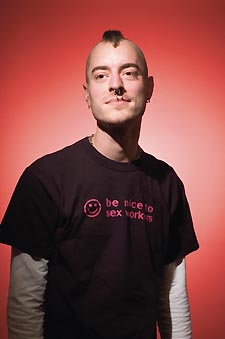 Rothermel |
CHRIS ROTHERMEL started off 2005 with a goal of helping in the fight against HIV/AIDS. In January of last year, he was being trained in his hometown, New Orleans, to offer counseling and HIV testing.
But when he decided to get tested himself as he went through training, he didn’t expect to be on the other side of the equation. He remembers the day he got his results: Jan. 25, 2005.
”It was a huge surprise. I always used condoms — that I knew of. But I also had a history of drug and alcohol abuse.” Only 21 at the time, Rothermel wasn’t starting just the year as HIV-positive, but his adult life.
”Luckily, I was working at a really supportive [HIV-related] organization, so I kind of had the gist of what was going on with my body. There was a wonderful network of support. And I was living with someone, a roommate, who had HIV and he knew the ins and outs of living with the virus.”
His coworkers in New Orleans walked him through the process of what he needed to do to stay healthy. Rothermel says it took him about six months to come to terms with his HIV status, to get to a point where he was comfortable discussing it — just in time for his world to be turned upside down again. Hurricane Katrina barreled into New Orleans in August 2005. He headed to Houston, the only city outside of his hometown where he had friends.
”Before Katrina hit, I was organizing a caravan for the Campaign to End AIDS (C2EA) that was traveling up to D.C. for Four Days of Action — rallies, civil disobedience, things like that. Once Katrina hit, I started organizing from Houston. I didn’t have anything else to do, and I didn’t want to sit in front of the TV all day watching horrible stories.”
Arriving in D.C. after the month-long caravan from Texas, he found a far more welcoming community than the one he’d left in Houston, which was inundated with Katrina evacuees. Whereas his welcome was worn in Texas, he found Washingtonians to be wonderfully friendly by comparison. So much so that he ended up relocating, and today works at Whitman-Walker Clinic providing outreach to young men who have sex with men. He’s also a client.
He hasn’t begun a drug regimen yet, though he says his comfort level with his doctor is such that, ”I would be comfortable taking meds if she told me to.” With his T-cells going up and his health being monitored, ”There’s no real reason I should be on meds, unless my T-cell count goes down.”
While his health today is good, Rothermel follows the history of his mental health — and the seeds that grew into the drug and alcohol abuse that he says likely led to a lapse in his safer-sex practices — back to his school days.
”I went to an all-boys Catholic school. That sort of relates to my HIV status. We took a whole semester in eighth grade to learn that if you jerk-off, you’re going to hell; [that] condoms are not effective in preventing HIV or STDs; [that] gay people are going to hell. All that good stuff. I’m sure it had a negative effect on me.”
Having experienced that sort of indoctrination, followed by substance abuse and his subsequent sero-conversion, Rothermel points to comprehensive sexual education as the most important tool in the fight against HIV.
”One person says a gay person is bad, then gay people cause AIDS. That’s the thinking in some people’s minds. It doesn’t matter if you’re gay or straight. It matters if you’re having unprotected sex, regardless of how you identify.”
In addition to fighting stigma, he says sexual education needs to include communication skills.
”I don’t think young people know how to properly negotiate condoms with their partners. It’s really important that we teach them the skills to communicate throughout sex.”
Though Rothermel says he’s generally optimistic about the fight, he adds that getting to that point where everyone is educated about sex is still a long way off.
”We know what can prevent HIV. All we have to do is make it happen.”
Support Metro Weekly’s Journalism
These are challenging times for news organizations. And yet it’s crucial we stay active and provide vital resources and information to both our local readers and the world. So won’t you please take a moment and consider supporting Metro Weekly with a membership? For as little as $5 a month, you can help ensure Metro Weekly magazine and MetroWeekly.com remain free, viable resources as we provide the best, most diverse, culturally-resonant LGBTQ coverage in both the D.C. region and around the world. Memberships come with exclusive perks and discounts, your own personal digital delivery of each week’s magazine (and an archive), access to our Member's Lounge when it launches this fall, and exclusive members-only items like Metro Weekly Membership Mugs and Tote Bags! Check out all our membership levels here and please join us today!




